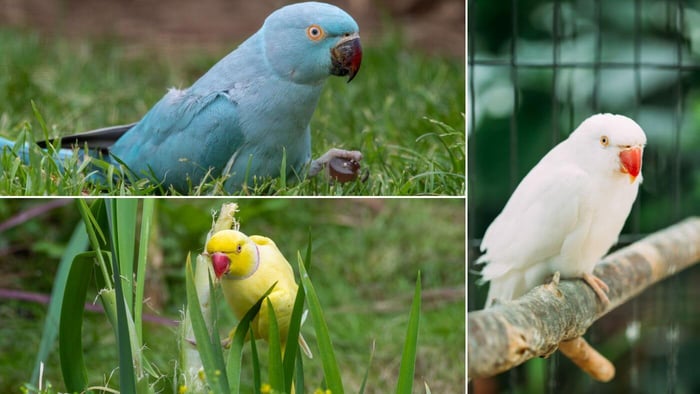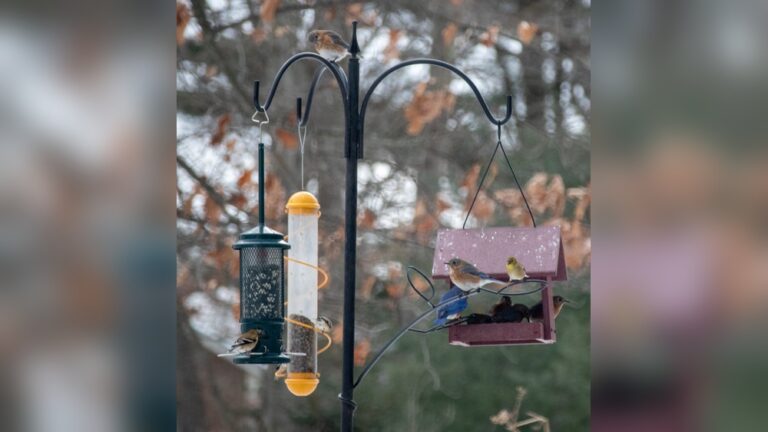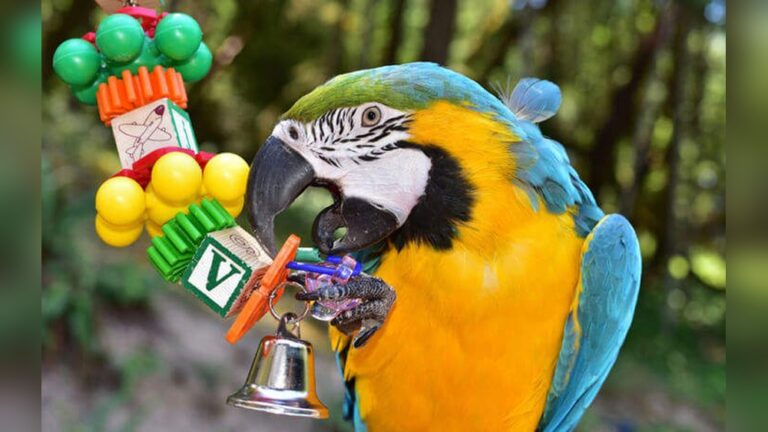African Ringneck Parrot Care Guide
If you’re thinking about bringing an African Ringneck Parrot into your home, you probably want to know exactly how to care for this beautiful bird. These parrots are lively, colorful, and full of personality, but they also need the right care to thrive.
In this guide, you’ll discover the key steps to keep your African Ringneck happy and healthy. From feeding tips to creating the perfect living space, you’ll find everything you need to give your feathered friend the best life possible. Keep reading to unlock the secrets of African Ringneck Parrot care and become the pet owner your bird deserves.
Choosing Your African Ringneck Parrot
Choosing your African Ringneck parrot is an important step. This bird will become a part of your home and heart. Pick a parrot that fits your lifestyle and needs. This guide helps you find a healthy bird with beautiful colors.
Selecting A Healthy Bird
Look for clear eyes and smooth feathers. The bird should be alert and active. Avoid birds with runny noses or dull feathers. Check the bird’s breathing; it should be easy and quiet. A healthy bird will show interest in its surroundings.
Ask the seller about the bird’s diet and health history. Choose a bird that eats well and behaves normally. Watch for signs of stress or fear. A calm bird will adapt better to your home.
Breeds And Color Variations
African Ringnecks come in several color types. The most common is the green variety. Blue, yellow, and albino colors also exist. Each color variation has unique beauty and charm. Some colors may be rarer and cost more.
Think about which color you like best. Some colors show dirt less than others. The bird’s personality stays the same across colors. Choose a color that makes you happy every day.

Credit: www.youtube.com
Housing And Cage Setup
Setting up the right home for your African Ringneck Parrot is very important. A good cage keeps your bird safe and happy. It also helps your parrot stay healthy and active. This section covers the best cage size, safe accessories, and where to place the cage.
Ideal Cage Size
The cage must be large enough for flying and climbing. A minimum size of 24 by 24 by 36 inches works well. Bigger cages give more space to move and play. Bars should be spaced ½ inch to ¾ inch apart. This stops your parrot from escaping or getting stuck.
Safe Cage Accessories
Use toys and perches made of bird-safe materials. Natural wood perches help keep feet strong. Avoid plastic or metal perches that can hurt your bird. Choose toys that are chewable but not toxic. Rotate toys to keep your bird interested. Provide a cuttlebone for calcium and beak care.
Placement And Environment
Place the cage in a quiet room with natural light. Avoid direct sunlight and drafts. Keep the cage away from kitchens and bathrooms. African Ringneck Parrots enjoy social time, so place the cage where family gathers. Ensure the room is warm and free from harmful fumes.
Nutrition And Feeding
Proper nutrition is key for a healthy African Ringneck Parrot. Feeding your bird the right foods helps it stay active and live longer. A good diet supports bright feathers and sharp senses. It also boosts the immune system, keeping illnesses at bay.
Knowing what to feed and what to avoid keeps your parrot happy. Below are important tips for feeding your bird well.
Balanced Diet Essentials
A balanced diet has seeds, pellets, fruits, and vegetables. Pellets provide vitamins and minerals in one package. Seeds are tasty but should be given in small amounts. Too many seeds can cause weight problems. Fresh fruits and vegetables add fiber and nutrients. Clean water must be available all the time.
Fresh Foods To Include
Offer apples, carrots, spinach, and broccoli often. These foods add vitamins A and C. Small pieces of mango and papaya make a sweet treat. Leafy greens help with digestion and keep feathers shiny. Avoid feeding only dry foods. Fresh foods give moisture and variety to meals.
Foods To Avoid
African Ringneck Parrots must never eat avocado or chocolate. These foods are toxic and can cause death. Avoid caffeine, alcohol, and salty snacks. Onions and garlic can upset their stomach. Do not feed your bird junk food or sugary treats. Stick to natural and safe options only.
Daily Care Routine
The daily care routine for an African Ringneck Parrot helps keep it healthy and happy. Consistent care builds trust between you and your bird. It also supports the parrot’s natural behaviors and needs. Small daily tasks make a big difference in their well-being.
Cleaning And Maintenance
Clean the cage every day to avoid germs and smells. Remove uneaten food and droppings. Change the water with fresh, clean water twice daily. Wipe the perches and toys to keep them safe and hygienic. Check for broken or damaged items that can hurt your bird.
Bathing And Grooming
Offer a shallow dish of water for bathing. Many African Ringnecks enjoy light sprays of water too. Bathing keeps their feathers clean and skin healthy. Use a soft cloth to gently wipe dirty feathers if needed. Trim nails carefully or ask a vet for help if you are unsure.
Exercise And Playtime
Allow your parrot time outside the cage every day. Provide safe toys that encourage chewing and climbing. Rotate toys often to keep your bird interested. Talk and interact with your parrot to stimulate its mind. Exercise helps prevent boredom and promotes good health.
Health And Wellness
Keeping your African Ringneck Parrot healthy is key to a happy life. Good health means a strong bird with bright feathers and clear eyes. Watch your parrot’s behavior and environment every day. Small changes can show early signs of health problems. Proper care helps prevent many illnesses. Nutrition, exercise, and a clean cage support wellness. Understanding common health issues helps you act fast. Knowing signs of illness keeps your bird safe. Regular vet visits catch problems early and keep your parrot healthy.
Common Health Issues
African Ringneck Parrots can face some health problems. Psittacosis, a bacterial infection, affects breathing. Feather plucking may show stress or skin issues. Beak and feather disease can cause feather loss. Vitamin A deficiency is common without a good diet. Obesity can happen from too many seeds. Regular care and a balanced diet reduce these risks.
Signs Of Illness
Look for changes in your parrot’s behavior and appearance. Fluffed-up feathers or sitting quietly for long periods may signal sickness. Loss of appetite or weight is a warning sign. Sneezing, coughing, or discharge from eyes or nose shows infection. Changes in droppings can also indicate illness. Early detection helps your parrot recover faster.
Regular Vet Visits
Take your African Ringneck Parrot to a vet experienced with birds. Annual check-ups help catch problems early. A vet can give vaccines and check for parasites. Discuss diet, behavior, and environment during visits. Early treatment improves your parrot’s health and life span. Don’t wait for serious signs; regular vet care is vital.
Behavior And Training
The African Ringneck Parrot is a smart and lively bird. Understanding its behavior helps in training and bonding. These parrots enjoy interaction and need mental stimulation. Training improves their mood and prevents boredom. Patience and consistency are key during the training process.
Socializing Your Parrot
Start socializing your parrot early. Spend time talking and gently handling it daily. Introduce your parrot to new people slowly. This reduces fear and builds trust. Use calm voices and soft movements. Social parrots are happier and less likely to bite.
Basic Commands And Tricks
Begin with simple commands like “step up” and “stay.” Use small treats as rewards for good behavior. Keep training sessions short and fun. Repeat commands clearly and patiently. Teach tricks such as waving or ringing a bell. These activities keep your parrot active and engaged.
Managing Behavioral Problems
Watch for signs of stress or boredom in your parrot. Common problems include biting, screaming, and feather plucking. Avoid yelling or punishment, as it can worsen behavior. Provide toys and activities to reduce boredom. Redirect negative behavior with positive reinforcement. Consistent routines help your parrot feel secure.
Breeding African Ringneck Parrots
Breeding African Ringneck Parrots requires patience and careful planning. These birds have unique behaviors during mating and nesting. Understanding their needs helps ensure healthy chicks and a happy pair. This guide covers the key aspects of breeding these beautiful parrots.
Mating Behavior
African Ringneck Parrots show strong pair bonds. They often mate for life. Males court females with soft calls and gentle feeding. Both birds preen each other to strengthen their bond. Signs of readiness include mutual feeding and close sitting. Watch for increased vocalizations during the breeding season.
Nesting Requirements
These parrots prefer large, deep nesting boxes. Use untreated wood for safety. The box should be placed in a quiet, dim corner. Provide soft materials like wood shavings or shredded paper. Keep the environment clean and dry. Maintain a temperature around 75°F to 80°F for comfort. Avoid disturbances to reduce stress.
Raising Chicks
After eggs hatch, parents take turns feeding chicks. They regurgitate soft food to feed their young. Chicks grow quickly and develop feathers within weeks. Monitor chicks for healthy weight gain and activity. Avoid handling chicks too much to prevent stress. Keep the nest clean to avoid infections. Provide fresh water and balanced nutrition for the parents.

Credit: parrotessentials.co.uk

Credit: parrotessentials.co.uk
How Smart Pets Lover Can Help You with African Ringneck Parrot Care Guide
Practical Learning Through Your African Ringneck Parrot Journey
Welcoming an African Ringneck Parrot into your home is as much about nurturing your own knowledge as it is about caring for your vibrant companion. As you establish the perfect housing and cage setup, take time to observe how your parrot interacts with its environment—this can reveal preferences that help tailor daily care routines. Nutrition and feeding offer another hands-on learning opportunity; experimenting with a variety of fresh fruits, vegetables, and pellets not only supports health but also strengthens your bond through mealtime engagement.
Remember, each step in training and understanding your parrot’s behavior deepens your connection and enriches your experience as a pet parent. Organizations like Smart Pets Lover aim to support this journey by providing trusted advice rooted in genuine care—because where every chirp tells a story, so does every moment of learning together.
If you ever need guidance or want to share your experiences, connecting with fellow bird enthusiasts or experts can be invaluable. Feel free to reach out to knowledgeable communities or local avian vets for personalized support.
Frequently Asked Questions
What Is The Ideal Diet For An African Ringneck Parrot?
African Ringneck Parrots thrive on a varied diet of pellets, fresh fruits, vegetables, and seeds. Avoid avocado, chocolate, and caffeine. Fresh water should always be available to keep them healthy and hydrated.
How Much Space Does An African Ringneck Parrot Need?
They need a spacious cage at least 24x24x36 inches. Additionally, daily out-of-cage playtime in a safe area is essential for exercise and mental stimulation.
How Often Should I Clean My African Ringneck Parrot’s Cage?
Clean the cage thoroughly once a week. Remove uneaten food and droppings daily. Regular cleaning prevents infections and keeps your bird healthy and happy.
Can African Ringneck Parrots Talk Or Mimic Sounds?
Yes, they are excellent mimics and can learn to talk. Early socialization and consistent training improve their speaking skills and bonding with owners.
Conclusion
Caring for an African Ringneck Parrot takes time and patience. These birds need daily attention and proper food. Clean cages keep them healthy and happy. Play and social interaction prevent boredom and stress. Watching their behavior helps catch problems early.
A well-cared parrot can live many years. Enjoy their vibrant colors and playful nature. Your efforts make a big difference in their life. Start simple, learn, and grow with your feathered friend. The joy they bring is worth every moment spent.







